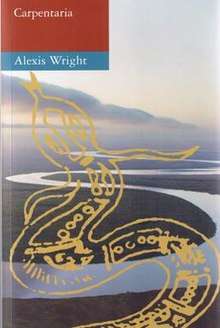Carpentaria (novel)
Carpentaria is the second novel by the indigenous Australian author Alexis Wright. It met with widespread critical acclaim when it was published in mid-2006, and went on to win Australia's premier literary prize, the Miles Franklin Award, in mid-2007.
 First edition cover | |
| Author | Alexis Wright |
|---|---|
| Cover artist | Russell White |
| Country | Australia |
| Language | English |
| Genre | Fiction |
| Publisher | Giramondo Publishing |
Publication date | 2006 |
| Media type | Print (paperback) |
| Pages | 519 pp |
| ISBN | 978-1-920882-17-4 |
| OCLC | 85863382 |
| 823/.914 22 | |
| LC Class | PR9619.3.W67 C37 2006 |
Plot introduction
The novel tells the interconnected stories of several inhabitants of the fictional town of Desperance, situated on the Gulf of Carpentaria in northwest Queensland. There, the Aboriginal people of the Pricklebush clan are engaged in a number of argumentative conflicts with various enemies in the community, including the white inhabitants of Desperance, the local law enforcement and government officials, and a large multinational mining operation that has been established on their traditional sacred land. The narrative chronicles the interpersonal relationships shared between three men embroiled in these disputes: the wise, pragmatic, and blunt Normal Phantom; the nomadic, overzealous shamanic practitioner of Aboriginal traditional religion, Mozzie Fishman; and Norm's son, Will Phantom, who deserted his father's house to undertake a cross-country spiritual journey with Fishman, but who has now returned home with something of Fishman's character in him.
Publication
At the time of publication the Australian bookstore chain Angus & Robertson decided to stock books produced by small presses only if the publishers themselves paid a requisite fee.[1] The implication of this decision was that such publishers would be unable to afford these fees, and therefore their publications would be removed from the shelves to make room for books that were likely to achieve higher sales. Carpentaria, after having been rejected by every major Australian publisher, was eventually published by Giramondo, one of the publishing houses targeted in Angus & Robertson's campaign; therefore the most recent winner of Australia's largest literary prize would no longer be stocked in one of Australia's largest bookstore chains.[2] This too received considerable media attention, and again boosted sales of the novel.
Reviews
- "Asia and Pacific Writers Network"
- "Australian Women's Book Review"
- "The Sydney Morning Herald"
- "Time Magazine"
External links
- Official listing for the novel at the website of Giramondo Publishing.
- A Question of Fear, audio of Wright's International PEN address.
Footnotes
- Rimmer, Charlie, ARW Group Commercial Manager. Letter to Michael Rakusin, 30 July 2007. Letter published at Undercover blog on the Sydney Morning Herald website. 9 August 2007.
- Wyndham, Susan. Bookshop chain puts bite on small publishers. Undercover blog at the Sydney Morning Herald website. 8 August 2007.
| Awards and achievements | ||
|---|---|---|
| Preceded by The Ballad of Desmond Kale |
Miles Franklin Award recipient 2007 |
Succeeded by The Time We Have Taken |